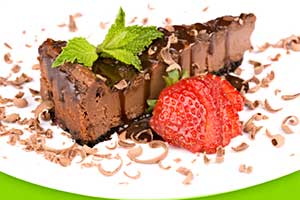It's easy to get answers about health and nutrition! Just send your question by email to [email protected] and Dr. Harlan will respond to selected questions of general interest. Answers will be posted in the Ask Dr. Gourmet newsletter (sign up now!) and archived in the Ask Dr. Gourmet section of the website.
Please note that the Ask Dr. Gourmet feature is restricted to questions regarding food and nutrition. Due to the many questions we receive, not all questions may be answered. For more specific questions about your individual health, please contact your doctor. About Timothy S. Harlan, MD, FACP, CCMS | Terms of Use | Privacy Policy
Ask Dr. Gourmet
How can a product contain hydrogenated oils yet be labeled "NO trans fats," "NO saturated fats," and "NO cholesterol"?
I am into reading labels. My husband has low good cholesterol, high bad cholesterol and high triglycerides. How can they say NO trans fats, NO sat. fats, NO cholesterol, when it contains hydrogenated oils?
Dr. Gourmet Says....

Certainly we have come to realize in the last few years that trans-fats are a major issue in the development of heart disease. While there remains some controversy, it's pretty clear that it's a good idea to work at eliminating them from your diet.
Trans-fats do occur in natural foods, but in very small amounts. Most of them are created when oils are saturated by the process of hydrogenation.
Here's a bit of science to help. Fats are long chains of molecules that have hydrogen atoms sticking off of them. The more hydrogen atoms, the more "saturated" the fat molecule is. Because of the greater number of hydrogen atoms sticking out of the molecule, the molecules stick together better. This is why saturated fats, molecules with lots of hydrogen atoms, stick together better and is why they are solid at room temperature as with butter or lard.
If there are fewer hydrogen atoms on the molecule, it is said to be unsaturated. One less hydrogen atom is monounsaturated and more would be polyunsaturated. Unsaturated fats are more often found in plant foods, like olive oil, peanut oil, etc., but they are also often found in fish. We know that unsaturated fats are the best choice for healthy eating, especially the Omega 3 fats. Vegetable oils contain no cholesterol.
Now, the food companies used to make more saturated fats by bubbling hydrogen into perfectly good and unsuspecting unsaturated fats. This is mainly for products that require a more solid fat at room temperature, like margarine, cookies, cakes and so on. In the past this was done indiscriminately and a lot of the hydrogenated fats were a particular type: trans-fats. Food companies now use methods that will hydrogenate fats but not create trans-fats. Likewise, many of the products have very little saturated fat so they are allowed to say "No Saturated Fats" on the label.
Thanks for writing.
Timothy S. Harlan, MD, FACP, CCMS
Dr. Gourmet
